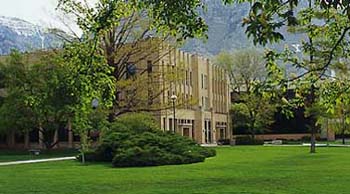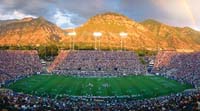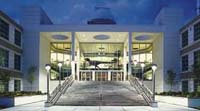Brigham Young University
Contents
Brigham Young University
All images used with permission from BYU. Copyright 2006
Originally established on October 16, 1875 as the Brigham Young Academy, Brigham Young Universitywas founded on principles of combined spiritual and secular learning.
Brigham Young University is sponsored by The Church of Jesus Christ of Latter-day Saints, or the Mormon Church. BYU is part of a Mormon Church Educational System, which serves more than 1.2 million people worldwide, including students at BYU in Provo, Utah; BYU–Hawaii in Laie, Hawaii; BYU–Idaho in Rexburg, Idaho; and LDS Business College in Salt Lake City, Utah. This education system also serves hundreds of thousands in continuing education and literacy programs, religious seminaries and institutes, and elementary and secondary schools in many countries, including Fiji, Mexico, New Zealand, Samoa, and Tonga.
Brigham Young University provides nationally recognized education in an atmosphere that upholds the moral standards of the Mormon Church, its sponsor.
BYU is recognized for extensive language programs, an academically minded and internationally experienced student body, talented performing arts ensembles, outstanding sports programs, quality teaching, and its beautiful mountain location. BYU is also known for being the number-one “stone-cold sober” school in the nation.
Who was Brigham Young?
Student Body Demographics
BYU students come from all 50 states, the District of Columbia, and more than 120 countries.
Daytime international students come from Asia, Canada, South America, Europe, Central America, Mexico, Eastern Europe and Russia, the Middle East, Africa, and the South Pacific.
In 2004-2005, 51.7 percent of BYU students were men and 48.3 percent were women. Of these, 75 percent were single.
Approximately 98 percent of BYU students were members of the Mormon Church, with the remaining 2 percent representing more than 20 other religions.
Faculty Recognition
There are approximately 1,600 full-time faculty members, 1,300 administrative employees, and 1,200 staff personnel. Part-time employees include approximately 550 faculty, 900 staff, and 13,000 students.
BYU faculty members hold advanced degrees from universities around the world, many of them speak one or more foreign languages, and they have conducted research and studies in various countries.
More than 86 percent of BYU full-time faculty have doctoral degrees. Thirty-eight percent are full professors, 33 percent associate professors, 26 percent assistant professors, and 3 percent instructors.
About 95 percent of the faculty are members of The Church of Jesus Christ of Latter-day Saints--the Mormon Church--with the remaining 5 percent representing, among others, the Baptist, Catholic, Episcopal, Islamic, and Jewish faiths.
BYU Statistics
Total BYU Alumni
Approximately 380,000
Statistics of admitted Freshman - Fall 2004
Students with ACT 24-30 was 89%
Average high school GPA was 3.74
Retention Rate was 95%
Percent of freshman in the top tenth of their graduating class was 48%
Undergraduate Degrees Granted 2003-2004 were 7,253
49% to men
51% to women.
Undergraduate tuition for 2004-2005
$1,705 for full-time Mormon students
$2,558 for full-time students of other faiths
Graduate tuition for 2004-2005
$2,155 for full-time Mormon students
$3,233 for full-time students of other faiths (higher because they have not paid tithing to the sponsoring Mormon Church like all Mormons are required to do)
BYU National Recognition
BYU was recognized in the 2005 edition of “America’s Best Colleges.” BYU received high marks from U.S. News & World Report in several categories, including being ranked in the second tier (74th) in the category of “Best National Universities,” 25th in “Great Schools at Great Prices” among national universities with doctoral programs, and ninth in the nation for least student-incurred debt. BYU's undergraduate accounting program was also ranked sixth and its undergraduate management program 38th in the nation.
BYU was ranked by Consumers Digest as the second-best value in American private education. The Princeton Review ranked BYU number one in the categories of having a "great college library" and being "stone-cold sober." BYU was also ranked sixth for "best quality of life" and seventh in "happiest students." In addition, the Institutional Research and Evaluation Inc. named BYU the safest campus in the nation for schools of its size.
BYU is ranked above the 90th percentile nationally in being supportive, academically challenging, and fostering active and collaborative learning as measured in the 2004 National Survey of Student Engagement among undergraduates. Additionally, this national survey shows that significantly more BYU undergraduates (86 percent) participate “very often” in activities to enhance their spirituality than do undergraduates nationally (18 percent). Furthermore, 74 percent of BYU undergraduates rate their overall education as being “excellent,” with the national rate standing at 33 percent.
Resource: Brigham Young University


